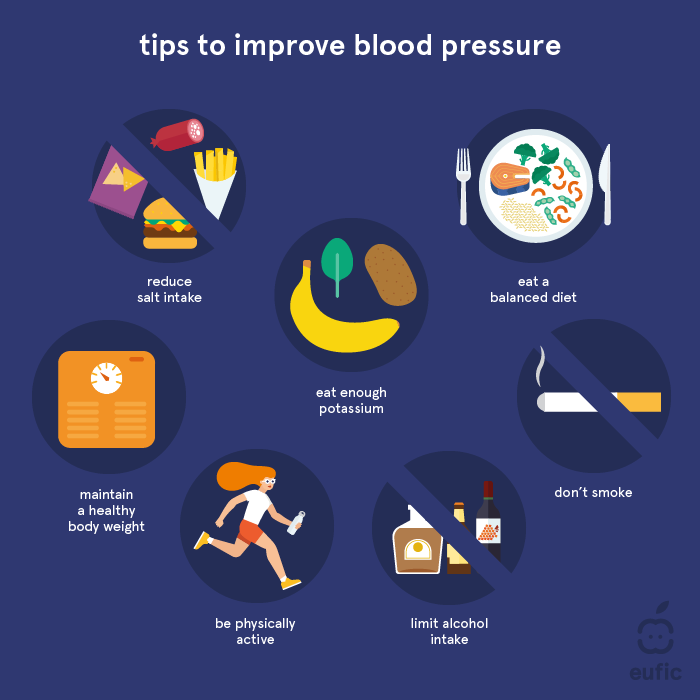7 lifestyle tips to help reduce blood pressure
Last Updated : 13 February 2023High blood pressure (or hypertension) is one of the most important risk factors for the development of heart disease and stroke. Our blood pressure can be influenced by many things, including our genes, diseases such as kidney disease, medications and lifestyle. For most of us, lifestyle plays the biggest role in increasing – or decreasing – our blood pressure.

Figure 1. Tips to improve blood pressure.
1. Reduce salt intake
Salt, or sodium chloride, has been used to flavour and preserve foods for thousands of years and is present in a variety of foods. Sodium and chloride are essential for many body functions, one of which is helping to manage the fluid balance of our blood, regulating our blood pressure. Unfortunately, eating too much salt can disturb this balance and leads to an increase in blood pressure. The European Food Safety Authority recommends we consume no more than 5 g of salt per day (around 1 teaspoon) to help reduce our risk of high blood pressure and heart disease.1
2. Eat enough potassium
Much like high amounts of salt, low intakes of potassium have also been linked to an increased risk of high blood pressure.2 Our bodies need potassium for many processes and like sodium, it helps maintain the fluid balance of our blood, regulating our blood pressure. By getting enough potassium, you can help counterbalance the negative effects of sodium and keep blood pressure in a healthy range. Potassium can be found in many fruits and vegetables, such as bananas, potatoes, spinach and lentils.
3. Eat a balanced diet
In addition to salt and potassium, our blood pressure may also be influenced by other nutrients. Eating a balanced diet rich in fruits and vegetables that is low in saturated fat, sugars and salt can ensure we get a variety of beneficial nutrients and help maintain energy balance, keeping our blood pressure healthy.
Many dietary approaches have been shown to reduce blood pressure. The most effective is thought to be the Dietary Approach to Stop Hypertension (DASH) and the Mediterranean Diet.3
4. Maintain a healthy body weight
Maintaining a healthy body weight is one of the most important factors when it comes to managing our blood pressure.4 As body weight increases, the demand on the heart also increases. This often leads to an increase in blood pressure. Our body weight is regulated by a complex system influenced by a variety of biological, psychological and environmental factors. These differ between people and mean it can be more difficult for some people to lose and maintain weight compared to others. When it comes to weight loss, we must burn more calories than we consume. However, there is no 'one size fits all' approach to weight loss and the ‘best’ approach is the one that can be enjoyed and stuck to long-term.
5. Be physically active
Physical activity has been continually shown to benefit both body and mind. This includes a positive effect on blood pressure. Regular physical activity can increase our heart’s strength, which reduces the effort needed to pump blood around the body. This decreases the force on our arteries, reducing blood pressure. The World Health Organization recommends we do a minimum of 150 minutes of moderate activity (e.g., brisk walking) or 75 minutes of vigorous activity (e.g., running) every week.5 This is equivalent to about 30 minutes of moderate activity five days per week.
6. Don’t smoke
Smoking cigarettes can cause the build-up of fatty material on the walls of our arteries. This leads to an increase in blood pressure and can cause clogging in our arteries, which increases the risk of a heart attack and stroke. If you smoke, quitting is the single most important lifestyle change you can make to protect your long-term health. Not smoking also reduces your risk of high blood pressure.6
7. Limit alcohol intake
Drinking too much alcohol can have negative health effects, including an increased risk of high blood pressure.7 A low-risk level of alcohol has been estimated at around 100 g of alcohol per week, equivalent to five, two-unit drinks (e.g., 200 ml of 12.5% vol wine; 500 ml of 5% vol beer) a week.8 However, recommendations vary across European countries and health organisations.9
Table 1. Alcohol recommendation from different health organisations.
|
Organisation |
Recommendation |
|
European Code Against Cancer10 |
|
|
European Society for Cardiology (ESC) 202111 |
|
In summary
High blood pressure is one of the leading risk factors for the development of heart disease and stroke. Our blood pressure is influenced by several factors. Avoiding smoking, staying active, eating a balanced diet and limiting intakes of salt and alcohol can greatly reduce our risk of high blood pressure.
References
- European Food Safety Authority., 2019. Dietary reference values for sodium. EFSA Journal, 17(9):5778.
- World Health Organization (WHO), 2012. Guideline: Potassium intake for adults and children. Geneva, Switzerland: WHO.
- Gay, H.C., Rao, S.G., Vaccarino, V. and Ali, M.K., 2016. Effects of different dietary interventions on blood pressure: systematic review and meta-analysis of randomized controlled trials. Hypertension, 67(4), pp.733-739.
- Lu, Y., Hajifathalian, K., Ezzati, M., Woodward, M., Rimm, E.B. and Danaei, G., 2014. Metabolic mediators of the effects of body-mass index, overweight, and obesity on coronary heart disease and stroke: a pooled analysis of 97 prospective cohorts with 1
- World Health Organisation (WHO), 2010. Global recommendations on physical activity for health. Geneva, Switzerland: WHO.
- Virdis, A., Giannarelli, C., Fritsch Neves, M., Taddei, S. and Ghiadoni, L., 2010. Cigarette smoking and hypertension. Current pharmaceutical design, 16(23), pp.2518-2525.
- Roerecke, M., Kaczorowski, J., Tobe, S.W., Gmel, G., Hasan, O.S. and Rehm, J., 2017. The effect of a reduction in alcohol consumption on blood pressure: a systematic review and meta-analysis. The Lancet Public Health, 2(2), pp.e108-e120.
- Wood, A.M., Kaptoge, S., et al. 2018. Risk thresholds for alcohol consumption: combined analysis of individual-participant data for 599 912 current drinkers in 83 prospective studies. The Lancet, 391(10129), pp.1513-1523.
- Reduce Alcohol Related Harm (RARHA) (2016) Reducing Alcohol Related Harm, Good Practice principles for low risk drinking guidelines.
- 11. IARC/ WHO (2016) International Agency for Research on Cancer/ World Health Organization, European Code Against Cancer, 12 ways to reduce your cancer risk.
- Visseren, FLJ, et al. 2021. 2021 European Guidelines on cardiovascular disease prevention in clinical practice. European Heart Journal, 42(34):3227–3337.
